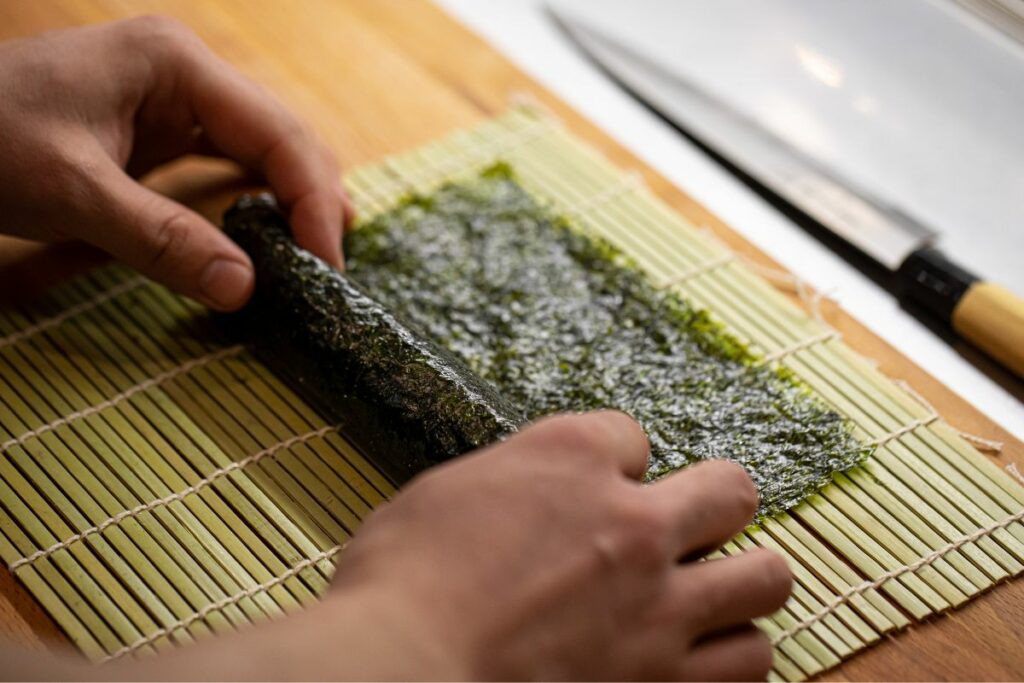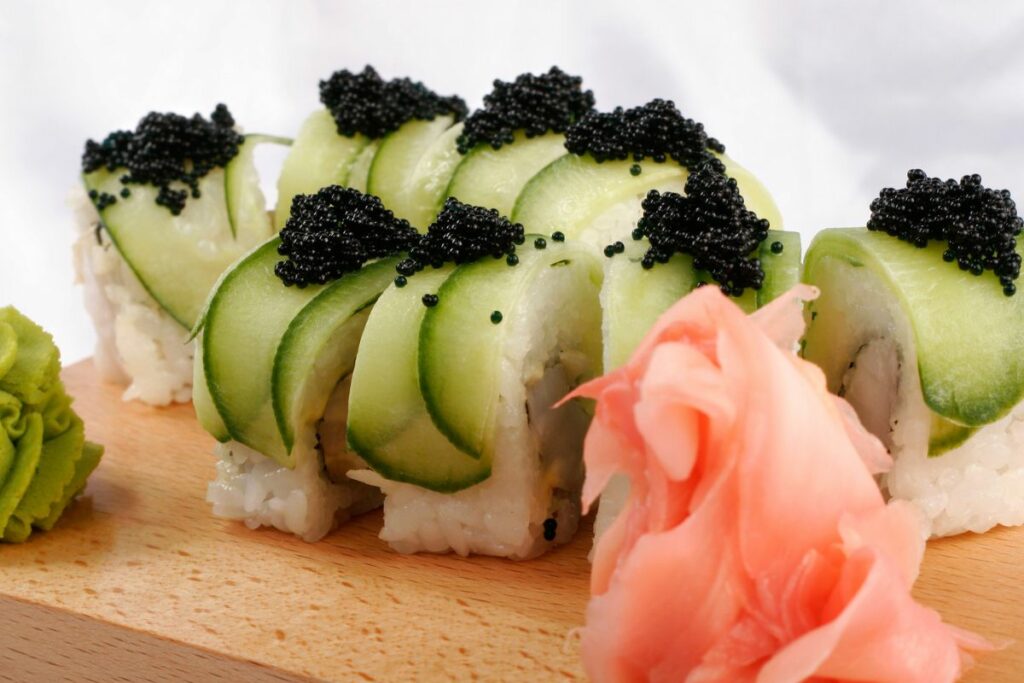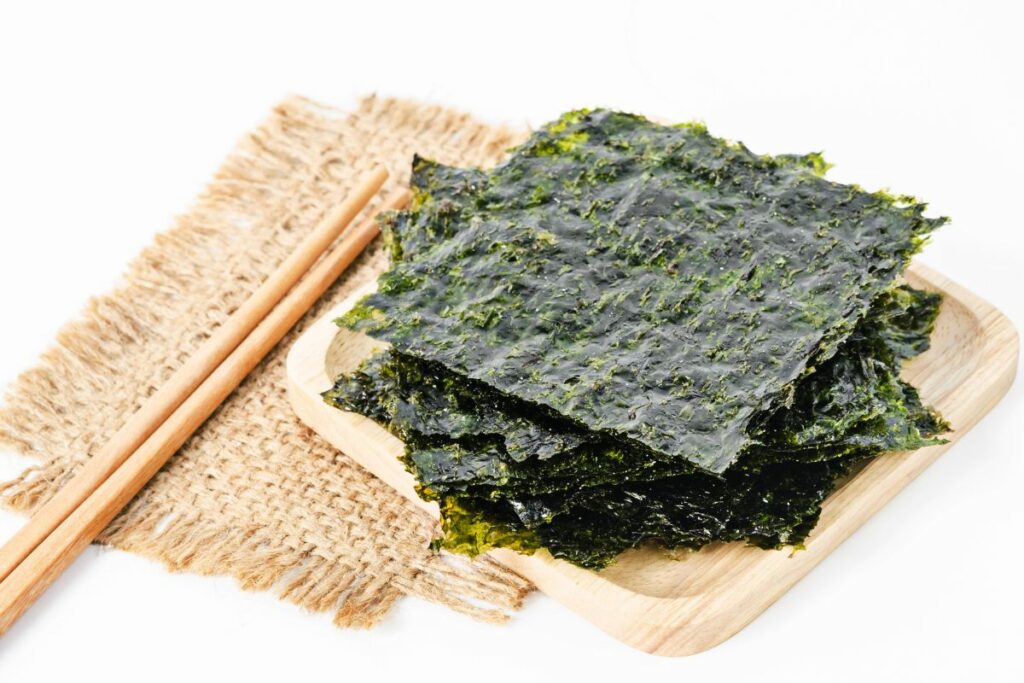Nori is a type of seaweed commonly used in Japanese cuisine to wrap sushi rolls. It is known for its distinctive flavor and texture, but some people may not enjoy the taste or have an allergy to seaweed. In such cases, finding a suitable nori substitute becomes necessary.
Fortunately, there are several alternatives to nori that can be used to wrap sushi rolls or add flavor to dishes. Some popular nori substitutes include rice paper, lettuce, thin omelet wraps, dried bonito shavings, and pickled leaves. Each substitute has its own unique flavor and texture, and some may work better than others depending on the dish being prepared.
In this article, we will explore the best nori substitutes and how to use them in your cooking. We will also discuss the nutritional benefits of these substitutes and any potential drawbacks to using them. Whether you’re a sushi lover looking to switch things up or someone with a seaweed allergy, this guide will help you find the perfect nori substitute for your needs.

Contents
Understanding Nori
Nori is a type of edible seaweed that is commonly used in Japanese cuisine, particularly in the preparation of sushi. It is a thin, dark green or black sheet that is usually roasted and seasoned with salt. Nori seaweed is known for its unique flavor that is both salty and slightly sweet, with a distinct umami taste.
Nori is harvested from the sea and processed into thin sheets that are dried and packaged for sale. It is a rich source of vitamins and minerals, including iodine, calcium, and iron. Nori sheets are also low in calories and high in fiber, making them a healthy addition to any diet.
In addition to sushi, nori can be used in a variety of other dishes, such as soups, salads, and rice bowls. It can also be used as a garnish or a snack, either on its own or flavored with various seasonings.
When purchasing nori sheets, it is important to look for high-quality products that are free from contaminants and have a fresh, crisp texture. Nori sheets can be stored in a cool, dry place for several months, but should be used within a few weeks of opening to ensure freshness.
Overall, nori is a versatile and nutritious ingredient that adds flavor and texture to a wide range of dishes. Whether you are a sushi lover or simply looking to incorporate more edible seaweed into your diet, nori is a great choice.
Why Substitute Nori
Nori is a type of seaweed that is widely used in Japanese cuisine, particularly in sushi rolls. However, there are several reasons why someone might want to substitute nori with an alternative ingredient.
Allergies
Some people may have an allergy to seaweed, which can cause an allergic reaction ranging from mild to severe. In such cases, it is necessary to find a suitable alternative to nori that does not cause an allergic reaction.
Acquired Taste
Nori has a distinct flavor and texture that may not be appealing to everyone. For some people, it may take some time to acquire a taste for nori. In such cases, it may be helpful to try out some nori substitutes to find an alternative that is more palatable.

Availability
Nori may not be readily available in all parts of the world. It may be difficult to find in some grocery stores, and if it is available, it may be expensive. In such cases, it may be more practical to use a nori substitute that is more readily available and affordable.
Cost
Nori can be expensive, especially if you are planning to make a large quantity of sushi rolls. Using a nori substitute can be a cost-effective alternative, especially if you are on a tight budget.
In summary, there are several reasons why someone might want to substitute nori with an alternative ingredient. Whether it is due to allergies, acquired taste, availability, or cost, there are several nori substitutes that can be used in place of nori to create delicious and healthy sushi rolls.
Vegetable Substitutes for Nori
If you’re looking for a vegetable substitute for nori, there are plenty of options available. Here are some of the best vegetable substitutes for nori:
Lettuce as a Nori Substitute
Lettuce is a great substitute for nori if you’re looking for a mild-flavored wrap. It’s also a good option if you’re looking for a low-carb or low-calorie alternative. Butter lettuce and romaine lettuce are both good options for wrapping sushi rolls. Just make sure to choose sturdy leaves that won’t tear easily.
Cucumber Wraps
Cucumber is another great option for wrapping sushi rolls. It has a mild flavor that won’t overpower the other ingredients, and it adds a nice crunch to the rolls. To use cucumber as a wrap, slice it lengthwise into thin strips using a mandoline or vegetable peeler. You can also hollow out the cucumber and fill it with your favorite sushi ingredients.
Collard Greens
Collard greens are a sturdy leafy green that can be used as a wrap for sushi rolls. They have a slightly bitter flavor that pairs well with savory and spicy ingredients. To use collard greens as a wrap, blanch them in boiling water for a few seconds to soften them up. Then, fill them with your favorite sushi ingredients and roll them up tightly.

Shiso Leaves
Shiso leaves are a popular ingredient in Japanese cuisine, and they can be used as a wrap for sushi rolls. They have a slightly minty flavor that pairs well with fish and other seafood. To use shiso leaves as a wrap, blanch them in boiling water for a few seconds to soften them up. Then, fill them with your favorite sushi ingredients and roll them up tightly.
Carrot and Radish
Carrot and radish can both be used as a crunchy and colorful alternative to nori. To use them as a wrap, slice them into thin strips using a mandoline or vegetable peeler. Then, fill them with your favorite sushi ingredients and roll them up tightly.
Overall, there are plenty of vegetable substitutes for nori that you can use to make delicious and healthy sushi rolls. Whether you prefer the mild flavor of lettuce or the crunch of cucumber, there’s a vegetable wrap that’s perfect for you.
Seafood Substitutes for Nori
When it comes to sushi, nori is a crucial ingredient that gives the dish its signature flavor and texture. However, if you’re looking for a nori substitute, there are several seafood options that you can try.
Salmon
Salmon is a popular seafood substitute for nori in sushi. It has a similar texture and flavor and can be used as a wrap for sushi rolls. To use salmon as a substitute for nori, simply slice the salmon into thin strips and use it to wrap your sushi fillings.
Smoked Salmon
Smoked salmon is another great substitute for nori. It has a similar texture and flavor to nori and can be used in the same way as regular salmon. Smoked salmon is also a great option if you’re looking for a more flavorful sushi roll.

Prosciutto
Prosciutto is a cured meat that can be used as a substitute for nori in sushi. It has a salty flavor that pairs well with sushi fillings and can be used to wrap sushi rolls. To use prosciutto as a substitute for nori, simply wrap the prosciutto around your sushi fillings.
When using seafood substitutes for nori, it’s important to keep in mind that they may have a stronger flavor than nori. It’s also important to choose high-quality seafood to ensure that your sushi rolls taste delicious.
Seaweed Substitutes for Nori
When it comes to sushi, nori is a key ingredient in making those delicious rolls. However, sometimes you may not have nori on hand or may want to switch things up a bit. Luckily, there are several seaweed substitutes for nori that can be used to make sushi or other dishes.
Kombu
Kombu is a type of kelp that is commonly used in Japanese cuisine. It has a slightly sweet flavor and is often used to make dashi, a broth used as a base for many Japanese dishes. Kombu can be used as a substitute for nori in sushi rolls. It has a similar texture and can be cut into thin strips or used as a wrap for sushi rice and fillings.
Wakame
Wakame is another type of seaweed commonly used in Japanese cuisine. It has a delicate flavor and is often used in miso soup and seaweed salad. Wakame can be used as a substitute for nori in sushi rolls. It has a slightly softer texture than nori but still works well as a wrap for sushi rice and fillings.
Hijiki
Hijiki is a type of seaweed that is commonly used in Japanese and Korean cuisine. It has a slightly sweet and nutty flavor and is often used in salads and stews. Hijiki can be used as a substitute for nori in sushi rolls. It has a slightly thicker texture than nori but still works well as a wrap for sushi rice and fillings.

Dulse
Dulse is a type of red seaweed that is commonly used in Irish cuisine. It has a salty and slightly smoky flavor and is often used as a snack or seasoning. Dulse can be used as a substitute for nori in sushi rolls. It has a slightly softer texture than nori but still works well as a wrap for sushi rice and fillings.
Gim
Gim is a type of seaweed commonly used in Korean cuisine. It has a slightly sweet and salty flavor and is often used as a snack or seasoning. Gim can be used as a substitute for nori in sushi rolls. It has a similar texture to nori and can be cut into thin strips or used as a wrap for sushi rice and fillings.
Overall, there are several seaweed substitutes for nori that can be used in sushi or other dishes. Each type of seaweed has its own unique flavor and texture, so feel free to experiment and find the one that suits your taste buds best.
Other Unique Substitutes for Nori
If you’re looking for a unique twist on your sushi rolls, there are a few other substitutes for nori that you might want to try out. Here are some options to consider:
Rice Paper
Rice paper is a thin, translucent sheet made from rice flour and water. It’s commonly used in Vietnamese cuisine, particularly in spring rolls. Rice paper is a great option for those who are looking for a gluten-free or low-carb alternative to nori. It has a mild flavor that won’t overpower the other ingredients in your sushi roll.
To use rice paper as a substitute for nori, simply soak it in warm water for a few seconds until it becomes pliable. Then, lay it flat on a sushi mat and add your desired fillings. Roll it up tightly and slice it into pieces.
Soy Wraps
Soy wraps are another alternative to nori that are becoming increasingly popular. They’re made from soybeans and other natural ingredients like rice flour, tapioca starch, and salt. Soy wraps have a mild flavor that pairs well with both savory and sweet fillings.
To use soy wraps as a substitute for nori, simply lay them flat on a sushi mat and add your desired fillings. Roll it up tightly and slice it into pieces.

Tofu Skin
Tofu skin, also known as yuba, is a thin, film-like layer that forms on the surface of heated soy milk. It’s commonly used in Chinese and Japanese cuisine, particularly in vegetarian dishes. Tofu skin has a slightly sweet flavor and a chewy texture that can add a unique element to your sushi rolls.
To use tofu skin as a substitute for nori, simply cut it into thin strips and use it to wrap your sushi fillings. You can also use it as a garnish on top of your sushi rolls.
Omelet
If you’re looking for a non-seafood alternative to nori, consider using a thin omelet as a wrap for your sushi fillings. Simply whisk together some eggs and cook them in a thin layer in a frying pan. Once the omelet has cooled, lay it flat on a sushi mat and add your desired fillings. Roll it up tightly and slice it into pieces.
Overall, there are a variety of unique substitutes for nori that you can try out to add some variety to your sushi rolls. Whether you’re looking for a gluten-free option or just want to switch things up, these substitutes are worth considering.
Using Nori Substitutes in Different Dishes
When it comes to Japanese cuisine, nori seaweed is a staple ingredient in many dishes. However, if you are looking for a nori substitute, there are many options available that can be used in various dishes. In this section, we will explore some of the best nori substitutes and how to use them in different Japanese dishes.
Sushi Rolls
Sushi rolls are the most common dish that uses nori seaweed. If you are looking for a nori substitute for sushi rolls, you can try using rice paper, yuba, or soy wraps. Rice paper is a common ingredient in Vietnamese cuisine and can be used to make spring rolls. Yuba is a soy-based product that is similar in texture to nori seaweed and can be used as a wrap for sushi rolls. Soy wraps are made from soybeans and other natural ingredients and have a mild flavor that pairs well with savory and sweet fillings.
Onigiri Rice Balls
Onigiri rice balls are another popular Japanese dish that uses nori seaweed. If you are looking for a nori substitute for onigiri, you can try using pickled plum leaves, shiso leaves, or thin omelet wraps. Pickled plum leaves have a sour and salty flavor that pairs well with rice. Shiso leaves have a minty and slightly spicy flavor that can add a unique taste to onigiri. Thin omelet wraps can be made by lightly cooking eggs and using them as a wrap for rice balls.

Soups and Stews
Nori seaweed is often used in Japanese soups and stews to add flavor and texture. If you are looking for a nori substitute for soups and stews, you can try using wakame seaweed, arame seaweed, or hijiki seaweed. Wakame seaweed has a delicate flavor and can be used in miso soup or as a topping for ramen. Arame seaweed has a slightly sweet and nutty flavor and can be used in soups or salads. Hijiki seaweed has a strong flavor and can be used in stews or as a side dish.
Ramen
Ramen is a popular Japanese dish that often includes nori seaweed as a topping. If you are looking for a nori substitute for ramen, you can try using spinach, kale, or thinly sliced vegetables. Spinach and kale can be blanched and used as a topping for ramen. Thinly sliced vegetables such as carrots, cucumbers, or radishes can be used to add crunch and texture to ramen.
In conclusion, there are many nori substitutes available that can be used in different Japanese dishes. Depending on the dish, you can use rice paper, yuba, soy wraps, pickled plum leaves, shiso leaves, thin omelet wraps, wakame seaweed, arame seaweed, hijiki seaweed, spinach, kale, or thinly sliced vegetables.
Nutritional Value of Nori Substitutes
Nori is a type of seaweed that is commonly used in Japanese cuisine, particularly in sushi. It is known for its unique flavor and texture, and it also has several nutritional benefits. However, for those who cannot use nori, there are several substitutes that can be used in its place.
One of the primary benefits of nori is its high iodine content. Iodine is an essential mineral that is important for thyroid function and overall health. Nori is also rich in calcium, iron, and vitamins A, C, and B. These nutrients are important for bone health, immune function, and overall well-being.
When it comes to nori substitutes, there are several options that can provide similar nutritional benefits. For example, tororo kombu is a type of kelp that is often used in Japanese cuisine. It is rich in iodine and other minerals, making it a good alternative to nori.
Another option is yuba, which is a type of tofu skin. It is high in protein and also contains calcium and iron. Rice paper is another substitute that can be used in place of nori. It is low in calories and fat, and it also contains some vitamins and minerals.
Overall, while nori is a unique and nutritious ingredient, there are several substitutes that can be used in its place. These substitutes can provide similar nutritional benefits and can be used in a variety of dishes, from sushi to salads and more.

Nori Substitutes for Different Dietary Needs
When it comes to finding a substitute for nori, it’s important to consider different dietary needs. Here are some options for those with specific dietary restrictions:
Gluten-Free Options
For those who are gluten-free, there are several alternatives to nori that can be used in sushi rolls. Rice paper is a popular choice, as it is made from rice flour and is naturally gluten-free. Other options include thinly sliced vegetables such as cucumber or carrots, or even lettuce leaves. It’s important to note that some brands of rice paper may contain trace amounts of gluten, so be sure to read the label carefully before purchasing.
Vegan and Vegetarian Choices
For those following a vegan or vegetarian diet, there are plenty of options for nori substitutes. One popular choice is yuba, which is made from soybeans and has a similar texture to nori. Another option is thinly sliced avocado, which can add a creamy texture to sushi rolls. Other vegan and vegetarian options include thinly sliced vegetables, such as bell peppers or zucchini, or even tofu.
It’s important to note that some garnishes commonly used in sushi, such as bonito flakes, contain fish and are not suitable for vegans or vegetarians. Instead, try using toppings such as sesame seeds, sliced scallions, or pickled ginger to add flavor and texture to your sushi rolls.
Overall, there are plenty of options for those looking to substitute nori in their sushi rolls. By considering different dietary needs, it’s possible to create delicious and satisfying sushi rolls that everyone can enjoy.
